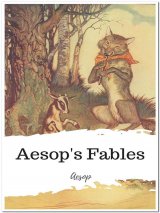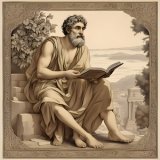Aesop's Fables Page #10
Aesop's Fables, or the Aesopica, is a collection of fables credited to Aesop, a slave and storyteller believed to have lived in ancient Greece between 620 and 564 BCE.
What is worth most is often valued least. THE DOG AND THE SHADOW A Dog was crossing a plank bridge over a stream with a piece of meat in his mouth, when he happened to see his own reflection in the water. He thought it was another dog with a piece of meat twice as big; so he let go his own, and flew at the other dog to get the larger piece. But, of course, all that happened was that he got neither; for one was only a shadow, and the other was carried away by the current. MERCURY AND THE TRADESMEN When Jupiter was creating man, he told Mercury to make an infusion of lies, and to add a little of it to the other ingredients which went to the making of the Tradesmen. Mercury did so, and introduced an equal amount into each in turn--the tallow-chandler, and the greengrocer, and the haberdasher, and all, till he came to the horse-dealer, who was last on the list, when, finding that he had a quantity of the infusion still left, he put it all into him. This is why all Tradesmen lie more or less, but they none of them lie like a horse-dealer. THE MICE AND THE WEASELS There was war between the Mice and the Weasels, in which the Mice always got the worst of it, numbers of them being killed and eaten by the Weasels. So they called a council of war, in which an old Mouse got up and said, "It's no wonder we are always beaten, for we have no generals to plan our battles and direct our movements in the field." Acting on his advice, they chose the biggest Mice to be their leaders, and these, in order to be distinguished from the rank and file, provided themselves with helmets bearing large plumes of straw. They then led out the Mice to battle, confident of victory: but they were defeated as usual, and were soon scampering as fast as they could to their holes. All made their way to safety without difficulty except the leaders, who were so hampered by the badges of their rank that they could not get into their holes, and fell easy victims to their pursuers. Greatness carries its own penalties. THE PEACOCK AND JUNO The Peacock was greatly discontented because he had not a beautiful voice like the nightingale, and he went and complained to Juno about it. "The nightingale's song," said he, "is the envy of all the birds; but whenever I utter a sound I become a laughing-stock." The goddess tried to console him by saying, "You have not, it is true, the power of song, but then you far excel all the rest in beauty: your neck flashes like the emerald and your splendid tail is a marvel of gorgeous colour." But the Peacock was not appeased. "What is the use," said he, "of being beautiful, with a voice like mine?" Then Juno replied, with a shade of sternness in her tones, "Fate has allotted to all their destined gifts: to yourself beauty, to the eagle strength, to the nightingale song, and so on to all the rest in their degree; but you alone are dissatisfied with your portion. Make, then, no more complaints. For, if your present wish were granted, you would quickly find cause for fresh discontent." THE BEAR AND THE FOX A Bear was once bragging about his generous feelings, and saying how refined he was compared with other animals. (There is, in fact, a tradition that a Bear will never touch a dead body.) A Fox, who heard him talking in this strain, smiled and said, "My friend, when you are hungry, I only wish you would confine your attention to the dead and leave the living alone." A hypocrite deceives no one but himself. THE ASS AND THE OLD PEASANT An old Peasant was sitting in a meadow watching his Ass, which was grazing close by, when all of a sudden he caught sight of armed men stealthily approaching. He jumped up in a moment, and begged the Ass to fly with him as fast as he could, "Or else," said he, "we shall both be captured by the enemy." But the Ass just looked round lazily and said, "And if so, do you think they'll make me carry heavier loads than I have to now?" "No," said his master. "Oh, well, then," said the Ass, "I don't mind if they do take me, for I shan't be any worse off." THE OX AND THE FROG Two little Frogs were playing about at the edge of a pool when an Ox came down to the water to drink, and by accident trod on one of them and crushed the life out of him. When the old Frog missed him, she asked his brother where he was. "He is dead, mother," said the little Frog; "an enormous big creature with four legs came to our pool this morning and trampled him down in the mud." "Enormous, was he? Was he as big as this?" said the Frog, puffing herself out to look as big as possible. "Oh! yes, much bigger," was the answer. The Frog puffed herself out still more. "Was he as big as this?" said she. "Oh! yes, yes, mother, MUCH bigger," said the little Frog. And yet again she puffed and puffed herself out till she was almost as round as a ball. "As big as...?" she began--but then she burst. THE MAN AND THE IMAGE A poor Man had a wooden Image of a god, to which he used to pray daily for riches. He did this for a long time, but remained as poor as ever, till one day he caught up the Image in disgust and hurled it with all his strength against the wall. The force of the blow split open the head and a quantity of gold coins fell out upon the floor. The Man gathered them up greedily, and said, "O you old fraud, you! When I honoured you, you did me no good whatever: but no sooner do I treat you to insults and violence than you make a rich man of me!" HERCULES AND THE WAGGONER A Waggoner was driving his team along a muddy lane with a full load behind them, when the wheels of his waggon sank so deep in the mire that no efforts of his horses could move them. As he stood there, looking helplessly on, and calling loudly at intervals upon Hercules for assistance, the god himself appeared, and said to him, "Put your shoulder to the wheel, man, and goad on your horses, and then you may call on Hercules to assist you. If you won't lift a finger to help yourself, you can't expect Hercules or any one else to come to your aid." Heaven helps those who help themselves. THE POMEGRANATE, THE APPLE-TREE, AND THE BRAMBLE A Pomegranate and an Apple-tree were disputing about the quality of their fruits, and each claimed that its own was the better of the two. High words passed between them, and a violent quarrel was imminent, when a Bramble impudently poked its head out of a neighbouring hedge and said, "There, that's enough, my friends; don't let us quarrel."
Translation
Translate and read this book in other languages:
Select another language:
- - Select -
- 简体中文 (Chinese - Simplified)
- 繁體中文 (Chinese - Traditional)
- Español (Spanish)
- Esperanto (Esperanto)
- 日本語 (Japanese)
- Português (Portuguese)
- Deutsch (German)
- العربية (Arabic)
- Français (French)
- Русский (Russian)
- ಕನ್ನಡ (Kannada)
- 한국어 (Korean)
- עברית (Hebrew)
- Gaeilge (Irish)
- Українська (Ukrainian)
- اردو (Urdu)
- Magyar (Hungarian)
- मानक हिन्दी (Hindi)
- Indonesia (Indonesian)
- Italiano (Italian)
- தமிழ் (Tamil)
- Türkçe (Turkish)
- తెలుగు (Telugu)
- ภาษาไทย (Thai)
- Tiếng Việt (Vietnamese)
- Čeština (Czech)
- Polski (Polish)
- Bahasa Indonesia (Indonesian)
- Românește (Romanian)
- Nederlands (Dutch)
- Ελληνικά (Greek)
- Latinum (Latin)
- Svenska (Swedish)
- Dansk (Danish)
- Suomi (Finnish)
- فارسی (Persian)
- ייִדיש (Yiddish)
- հայերեն (Armenian)
- Norsk (Norwegian)
- English (English)
Citation
Use the citation below to add this book to your bibliography:
Style:MLAChicagoAPA
"Aesop's Fables Books." Literature.com. STANDS4 LLC, 2025. Web. 10 Jan. 2025. <https://www.literature.com/book/aesop%27s_fables_316>.




Discuss this Aesop's Fables book with the community:
Report Comment
We're doing our best to make sure our content is useful, accurate and safe.
If by any chance you spot an inappropriate comment while navigating through our website please use this form to let us know, and we'll take care of it shortly.
Attachment
You need to be logged in to favorite.
Log In